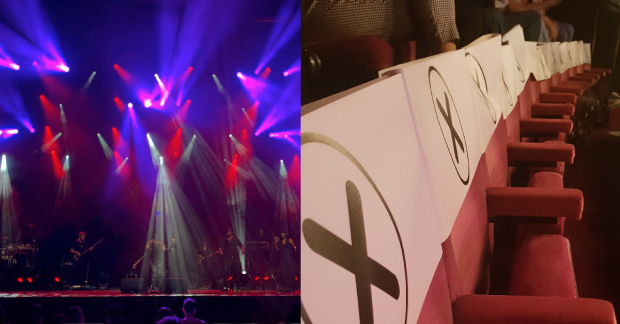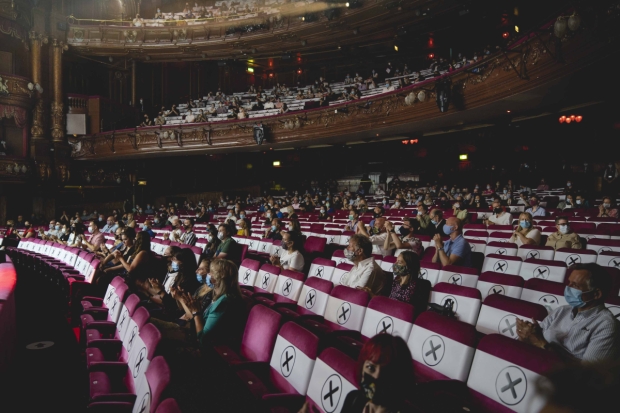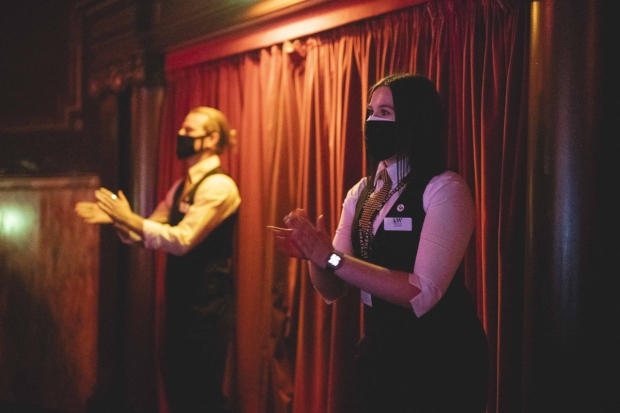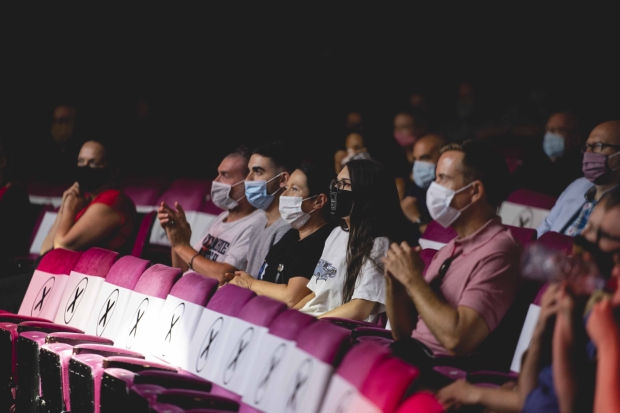What is it like watching a socially distanced West End performance?
The first West End show in months was staged yesterday – here’s what we thought

"It's a misery for performers" .
Not the most positive way to start what was the first West End show to be staged since venues had to close en masse on 16 March.
Four months on and, though social distancing measures have been altered, the circumstances are still desperate for the arts sector – even with a £1.57bn package announced by UK Chancellor Rishi Sunak, questions still remain about whether or not any shows will be possible this side of 2021. The countdown is on to see if panto is a no-go.
Step forward Andrew Lloyd Webber, seemingly taking it upon himself to push for trial performances, operating in tandem with the UK government to see how feasible indoor productions might be by piloting a one-off show at what he has often described as his "favourite" venue – The London Palladium.
The man himself emerged onto the stage at the start of yesterday's 2pm scheme to a thunderous applause – his moment with his captive pilot audience. He chatted candidly about his efforts to get performances back on stage, not simply for himself, for all venues across the world.
See photos from the pilot event
Lloyd Webber didn't get his way entirely – rather than packing out the massive 2000 plus-seater venue as he initially wanted, he had to settle for a socially distanced 640 seats. It did mean the atmosphere sagged somewhat – cheers felt slightly more isolated, and it was hard to get a sense of what was going on in the other parts of the auditorium. Even Lloyd Webber acknowledged the slightly empty atmosphere: "It's a rather sad sight – The Palladium is meant to be full. It is meant to love you."

© Andy Paradise/Paradise Photo
"Guinea pigs", we were described as, before he ran through the various and extensive measures that had been put in place to keep us safe from the killer virus. According to the Lord, fresh air was being pumped in from above the Palladium, filtered through refinement systems and then sucked back out of the auditorium. "You are safer in here than out on Oxford Street", less than 100 metres away.
The Phantom and Starlight Express composer and venue owner had a few aces up his sleeve too – every audience member has to stand on a step and have their temperature checked before entering the building, while a special fogging machine can be deployed to cleanse the venue: "this theatre was fogged yesterday and the chemical that it is fogged with is effective against the virus for four weeks, but we would do it every fortnight."
Staggered entry times, QR code track and trace systems, floor markings, one-way systems and socially distanced toilet cubicles are all comprehensive and unmissable, a slick addition to the conventional theatre rigmarole.
Light-hearted masked ushers wander between the aisles, offering punters a chance to order drinks and snacks to their seats. It all prevents excessive congestion (you're essentially paying £7.50 for a tinny). The queues for the toilets were minimal ( or maybe audiences were too cautious to try) and there never seemed to be any bottlenecks.

© Andy Paradise/Paradise Photo
His scheme emulates almost entirely that of South Korea, where shows have been running without social distancing since March (save for a special spraying machine mentioned here, which wasn't used at the Palladium, because it would unlikely be available to other theatres). Of course, South Korea has had a slightly easier time of things than some countries, and operates with a much more efficient track and trace system than elsewhere.
Lloyd Webber wasn't just being pessimistic – social distancing in theatres truly doesn't work for large-scale shows. On a financial or artistic level. Unless you have a powerhouse performance there to do the heavy lifting and overcome the big, gaping holes in the audience, then the whole thing would feel muted, sparse and stagnant.
But, oddly enough, yesterday's pilot show did have a powerhouse performance ready to remind you just what the magic of live shows feels like – a Beverley Knight in shining armour. Number after number, from a foot-stomping "I Can't Get No Satisfaction" through to a quiet, surging "Memory" from Cats (Knight had previously taken on the role at the same venue in 2015), the solo performer charmed, dazzled and awed the socially distanced six hundred into a steady euphoria.
If anything, staging something like a sedate play would have proven Lloyd Webber's point more – show audiences just how dire it can be to put on a piece with a quarter-full house (having put on a show at the Edinburgh Fringe, it is demoralising for all involved). But Knight, with her innate charisma, spine-tingling vocals and some stirring words, made the cavernous Palladium feel like a cosy catch-up, a joyful flashback to what we're all fighting for.
If socially distanced shows may have to be the new normal for the time being, then make sure you have Beverley Knight on hand to deliver the goods.
So that's what the pilot show was – an important but early stepping stone on a very wide and treacherous river. The battle isn't just about making shows logistically safe, but convincing audiences that it will be fine for them to press into an enclosed space without social distancing. That road will take a whole lot longer, and even a few percentage points off average attendance can be the difference between a viable production and a risky one.

© Andy Paradise/Paradise Photo
But time is running out, as Lloyd Webber makes resoundingly clear: "What we need badly is a date for reopening. Everyone understands that a spike in the virus could mean a delay, but we need a target."
The composer may not be a lyricist but he even came up with his own hashtag to send to the Prime Minister – #GiveUsADateMate.
See photos from the pilot event












